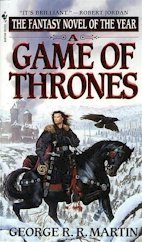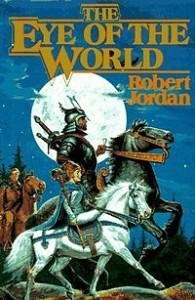So—Is Epic Fantasy Misogynist? Part 3: "The Wheel of Time" & "A Song of Ice and Fire" Series, and Conclusion
Just to reprise the premise of this post series, on Wednesday I began to explore the question of whether I believe it really is true that epic fantasy, as a subgenre, is misogynist and determined that, in order for the answer to be positive, I would have to conclude that epic fantasy "consistently conveys an inherent hatred of women."
 Yesterday, I commenced the process of looking at a couple of well known series in more detail, beginning with JRR Tolkien's The Lord of the Rings. (Where else could you begin?) And concluded that, like Galadriel at the end of The Fellowship of the Ring, JRR's seminal work in the epic fantasy subgenre "passed the test."
Yesterday, I commenced the process of looking at a couple of well known series in more detail, beginning with JRR Tolkien's The Lord of the Rings. (Where else could you begin?) And concluded that, like Galadriel at the end of The Fellowship of the Ring, JRR's seminal work in the epic fantasy subgenre "passed the test."
Today I am looking at Robert Jordan's Wheel of Time series (WoT) and George RR Martin's A Song of Ice and Fire (ASOIAF—the first book of which is the recently televised A Game of Thrones) which have been dominant forces in epic fantasy for much of the past two decades. (The Eye of the World was first published in 1990; A Game of Thrones in 1996.)
So let's take a look.
By contrast with The Lord of the Rings, discussed yesterday, Robert Jordan's Wheel of Time series (WoT) has a great many female characters, many of them ostensibly powerful and influential. There are the Aes Sedai, the all-female magical power users, who are also political power brokers within the world (a little like Frank Herbert's Bene Gesserit); the Wise Ones of the Aiel society; and also numerous queens and political leaders—as well as the central female protagonists of Nynaeve, Egwene, Elayne and Moiraine, plus several prominent secondary and tertiary characters. These include the female Forsaken, such as Lanfear, Moghedien and Graendal.
So, lots of strong female characters doing important stuff: there should be no problem, right? Except that, as the series went on, I couldn't help noticing that all these supposedly strong women never seem to end up doing anything really important (the exception is Moiraine, but she drops out at the end of the fourth book.) Rather, they seem to concentrate their energies being catty, bitchy, and petty. In addition, the three central protagonists, Nynaeve, Egwene, and Elayne (and others, but most noticeably and consistently these three) are always more concerned about their clothes and in particular the hem- and necklines that always seem to plunge mysteriously up and down whenever they think about their male love interests/objects of desire (which they do pretty much constantly) than they are with the task at hand, no matter how serious this may be.
The women in the Wheel of Time series are all also—almost without exception, whether on the side of "light" or "dark"—exclusively devious and manipulative, as well as strongly hierarchical (i.e. to the point of being fascist) and into corporal punishment and mortification of the flesh for almost any infraction of "the rules" (read hierarchical-fascist), however minor. They also seem to spend a lot of time either imagining themselves being stripped naked, or being actually stripped naked, or subjugated physically in some other way, when they are taken prisoner. The only place where the hierarchical-subjugative pattern is examined/questioned, rather than accepted (e.g. as with the Aes Sedai and the the Wise Ones) is in the case of the Seanchan and the treatment of damane in Book 2, The Great Hunt.
And somehow, the kick-butt female warriors of the Aiel, the Maidens of the Spear, never get to really fight or do anything useful in a practical sense … Oh yes, that's right, it's because the central male protagonist, Rand Al Thor, doesn't like women fighting and dying for him. So, chivalrous or chauvinist? Given that these women are dedicated warriors and part of a warrior society that has existed for thousands of years, footing it with their male counterparts, I'm going for chauvinist, i.e. Rand doesn't respect their freedom to choose for themselves as adult human beings.
To be fair to Jordan, in the 5 or 6 books before I gave up on the series (for a whole host of reasons of which the treatment of the female characters was only one, albeit an important one) he never actually got into full-on graphic description of war violence toward women, in terms of rape and mutilation—and the torture meted out by the Forsaken tended to be fairly evenly allocated between men and women (as I recall.) Also, the physical subjugation following capture is not unrealistic in a war situation, especially where the Geneva Convention does not apply.
Overall, however, I consider that the way in which all Jordan's female characters conform to a very narrow and negative stereotype in terms of behaviour, character and views, as well as the consistent focus on physical subjugation of the female, whether by other women or by men, makes it difficult not to see Jordan's treatment of women as inherently sexist at best. But does the sexism and the narrow and inherently demeaning/unflattering view of women—particularly suppsoedly powerful women—prevalent in WoT cross the boundary into outright misogyny, a hatred of women and the female? I hesitate to state a categoric "yes", but feel that Jordan' skirts the boundary very closely in places.
 A Game of Thrones: A Song of Ice
and Fire Series (ASOIAF)
A Game of Thrones: A Song of Ice
and Fire Series (ASOIAF)
According to NY reviewer Ginia Bellafante of the New York Times, the recently released HBO series, " 'Game of Thrones' is boy fiction patronizingly turned out to reach the population's other half." The "true perversion", though, according to Ms Bellafante, "is the sense you get that all of this illicitness has been tossed in as a little something for the ladies, out of a justifiable fear, perhaps, that no woman alive would watch otherwise."
Interesting reading, as I'm sure you can imagine, for one of those benighted female souls who would watch A Game of Thrones—if it ever gets to New Zealand—and has read all four books in the George RR Martin series to date and not because of the sexual perversion to which she refers (a very small part of the overall story and one which pales, in my opinion, in the context of the innumerable political perversions on offer.) But on to the critical point (which I took Ms Bellafante's remarks to perhaps infer): is George RR Martin's epic A Song of Ice and Fire (ASOIAF) series misogynist?
Like Jordan, and unlike Tolkien, ASOAIF has a large cast of female characters—too many to really enumerate (it's a huge series in every sense of the word), but they are certainly diverse. From the very different Stark sisters, Sansa and Arya, one gentle and 'girl-y', one fierce and tomboyish; to the child-bride Daenerys who becomes the 'mother of dragons'; from devoted wife and mother Catelynn Stark; to the incestuous-adultress and inept political schemer, Cersei Lannister; to the awkward female knight Brienne, these women only have one thing in common: they are real women who change and evolve in relation to the circumstances, mostly adverse, that they experience. (OK, maybe with the exception of Cersei—no spoilers, I hope, for all you lucky folk who can view the TV series, but really, she isn't very bright. Learning is not her strong suit.)
One of the best examples of Martin's charcter development, in my opinion, is Sansa Stark. When the story begins she is a gentle but also silly teen girl who very much sees the world as she wants it to be—i.e. in terms of her rose-tinted romantic dreams—and not as it is. Needless to say, she lives in an already brutal world that is about to become more so and gets a very rude awakening. (This is not a spoiler—if there is one thing you can be sure of in this series it's that characters will receive rude awakenings.) Through the subsequent three books, the reader sees Sansa, in many ways still the same gentle girl, become a great deal less foolish and considerably stronger in herself. At no point does she pick up a sword or cast a magic spell, the evolution lies in her character and her relationship to the world around her—an increasingly brutal world, as I said.
But the thing about the brutality of the ASOIAF world is that it is, from an historical point of view, completely realistic—and there's absolutely no question, the brutality falls equally upon male and female alike. Also, I never feel that the violence is gratuitous. It always serves a purpose in the story and I never get the sense that the author is gettting off on it for its own sake.
So is A Game of Thrones/the ASOIAF series misogynist? The answer to that, in my opinion, is a resounding "no."
Conclusion
As I said on Wednesday, I am not in a position to do a comprehensive survey of the entire body of epic fantasy, but I have read a fair bit of it over the years and I believe the discussion of the three major series above represents a fair 'litmus test.'
Most of what I have read, including other authors such as Lois McMaster Bujold, Kate Elliot, Guy Gavriel Kay, Steven Erikson, Patrick Rothfuss, Midori Snyder and Patricia McKillip with her Riddlemaster trilogy, falls into the Tolkien/Martin camp, where my answer to the question: "are these works misogynist?" is no.
A few, like Jordan, definitely skirt the border into "yes" and some, like Stephen Donaldson's Thomas Covenant series, may slip over it at times as with the defining rape scene in Lord Foul's Bane. So the misogynist element is there in some works—but not many, in my experience. And sexual violence toward women is not, in my opinion, anywhere near as prevalent a part of the epic oeuvre as it is in some other forms of Fantasy, such as the dark and paranormal subgenres. Or in other forms of fiction for that matter, such as crime and thrillers, which I find draw heavily on crimes of violence against women for their raison d'etre.
So in terms of whether epic fantasy as a subgenre consistently conveys an inherent hatred of women, my answer has to be "no." In terms of those books that do skirt or cross the border into misogyny, the question then becomes whether there are enough of them to write off the subgenre itself as misogynist, i.e. to say that the form itself is inherently driving misogynist writing? Once again, I believe that the answer is "no."




